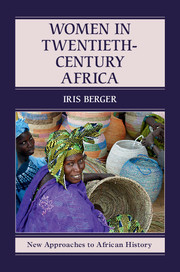Book contents
- Frontmatter
- Dedication
- Contents
- LIST OF ILLUSTRATIONS
- LIST OF MAPS
- PREFACE
- Map
- Introduction
- 1 Colonizing African families
- 2 Confrontation and adaptation
- 3 Domesticity and modernization
- 4 Mothers of nationalism
- 5 The struggle continues
- 6 “Messengers of a new design”: marriage, family, and sexuality
- 7 Women's rights: the second decolonization?
- 8 Empowerment and inequality in a new global age
- Contradictions and challenges
- REFERENCES AND FURTHER READING
- INDEX
1 - Colonizing African families
Published online by Cambridge University Press: 05 May 2016
- Frontmatter
- Dedication
- Contents
- LIST OF ILLUSTRATIONS
- LIST OF MAPS
- PREFACE
- Map
- Introduction
- 1 Colonizing African families
- 2 Confrontation and adaptation
- 3 Domesticity and modernization
- 4 Mothers of nationalism
- 5 The struggle continues
- 6 “Messengers of a new design”: marriage, family, and sexuality
- 7 Women's rights: the second decolonization?
- 8 Empowerment and inequality in a new global age
- Contradictions and challenges
- REFERENCES AND FURTHER READING
- INDEX
Summary
In her moving novel The Joys of Motherhood, Nigerian writer Buchi Emecheta portrays the dramatic changes in marriage, motherhood, and family life in early twentieth-century Africa, emphasizing her main character's struggles to survive in a confusing colonial city. Nnu Ego is forced to leave her home village for an arranged second marriage after an earlier union failed to produce children. Ironically, now unhappily wed to Nnaife, her fertility blossoms. After the tragic death of her four-week old son and her failed attempt to commit suicide, she becomes pregnant again and pictures her new son as an adult, unlike his father, a “perfect figure of a man.” When he grows up, she imagines, he will live next door to her in a rural compound bustling with goats and hens, and relatives and friends, where she will tell stories of her life in a crazy, demeaning town called Lagos.
The book goes on to explore the heartaches and challenges Nnu Ego faces trying to survive and raise her children in a “white man's world.” As she struggles to feed her family by selling cigarettes, matches, paraffin, and chopped wood at a stall in the market, her husband Nnaife goes from job to job and squanders any extra money on alcohol and lavish ceremonies. Adding to the family's woes, after his brother's death, Nnaife takes the young widow Adaku as a second wife. Despite the stress of sharing their cramped quarters with a co-wife, Adaku's refusal to accept their husband's foibles provokes Nnu Ego to think more critically about her own life. When Adaku urges them to stop cooking for their husband until he provides sufficient housekeeping money, Nnaife responds violently, telling Nnu Ego that feeding the children is her responsibility. His response prompts her to reflect: “At home in Ibuza she would have had her own hut and would at least have been treated as befitting her position [as a senior wife], but here in Lagos, where she was faced with the harsh reality of making ends meet on a pittance, was it right for her husband to refer to her responsibility?”
- Type
- Chapter
- Information
- Women in Twentieth-Century Africa , pp. 6 - 29Publisher: Cambridge University PressPrint publication year: 2016



